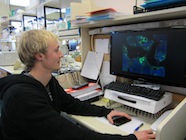 Henry undertook his honours and PhD research within the Cancer Genetics group. He now works as a research fellow at the Edinburgh Cancer Research Centre, Scotland.
Henry undertook his honours and PhD research within the Cancer Genetics group. He now works as a research fellow at the Edinburgh Cancer Research Centre, Scotland.
Targeting cancer cell vulnerabilities
Henry’s PhD studies in the Cancer Genetics Lab continued on from his BBiomedSci degree in biochemistry and pharmacology. He is searching for a drug that will be synthetically lethal to cancers lacking the CDH1 gene.
Usually these cancer cells that lack CDH1 survive as an alternative pathway compensates for it. By removing this alternativepathway using a drug, the cancer cells die whereas the healthy cells can still function without it and will survive.
“The very reason these cells are able to grow and form cancer also makes them vulnerable”
For the good of science and friendship
Following his Mother’s involvement in the breast cancer foundation, Henry has had a life-long interest in this field of study. "I would like to work in clinically relevant area in which I can make a real difference."
Henry suggests budding scientists should avoid subjects they don’t enjoy and similarly, it helps to focus on things that interest you a lot – and to learn to deal with failure positively!
He is keen to pay forward the help he was readily given when he started out in the lab. As Henry says; even with meticulous planning, the hardest part of science is that each experiment only contributes a small amount to the overall picture. "It’s the slow but progressive aggregation of knowledge that eventuates in a break through."
Henry’s passions outside science involve adrenaline sports and the building of a house with his Father, it was completed in 2013 but is a never ending project!
